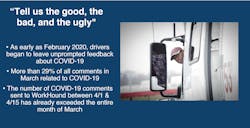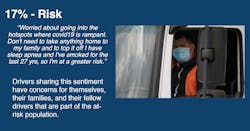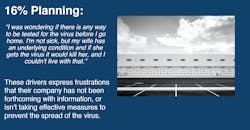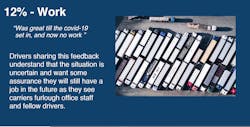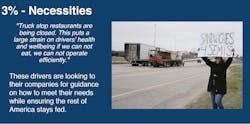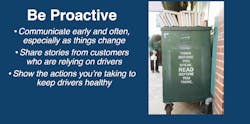How carriers respond to COVID-19 matters for drivers
The most common concern for commercial truck drivers operating during the COVID-19 pandemic is pay, according to data collected by WorkHound CEO and co-founder Max Farrell and his team.
WorkHound gathers anonymous feedback via text message from thousands of truck drivers across the country. The company’s most recent analysis looks back on April 1 through 15, during which time drivers shifted their focus to COVID-19.
During an April 24 Stifel conference call analyzing driver feedback through the COVID-19 crisis, Farrell pointed out that one driver comment, in particular, stood out to his team: “I wish our bosses would see these dark days and not only say ‘good work,’ but put at least more cents per mile on such days.”
As drivers work on the front lines and continue to take chances traveling across the country, interacting with strangers and in possible high-risk areas, many feel they deserve additional or hazard pay, according to WorkHound.
But not all driver comments regarding pay were simply requesting more money. There was an emerging trend around deferrals for truck payments and tuition owed to companies for student drivers, Farrell noted. He added that a portion of commenters thanked their companies for any actions taken to support them financially—think bonuses and reimbursements for additional cleaning supplies.
WorkHound’s focus is to help carriers and their drivers create a real-time feedback loop by prompting drivers to share open-ended, anonymous feedback via text message.
“The link is always live, and we always want drivers to know that they have a voice 24/7,” Farrell explained. “Whenever drivers share feedback, we ask them to tell us the good, the bad and the ugly.”
In early February, WorkHound began seeing COVID-19 come up in feedback. In March, more than 29% of all comments on the platform were related to COVID-19. And just halfway through April, all comments related to COVID-19 exceeded the entire month of March.
Analyzing the data, Farrell said a clear concern stood out: Drivers want to know that during these times their company has their back.
“There’s a lot of uncertainty right now. Drivers are looking for their company to be reassuring that they will be taken care of,” Farrell explained. “Drivers will remember how their companies responded during this time, and they will always remember how they felt during this pandemic.”
As COVID-19 has presented additional communication barriers, Farrell and his team created a specific COVID-19 “theme” to track all comments related to the pandemic. From there, the team analyzed the nearly 2,000 specific comments around COVID-19. Comments were then broken down into nine themes—pay, morale, sanitation, risk, planning, work, necessities, benefits, and denial.
Brian Matthews, vice president of operations at American Central Transport (ACT), explained that ACT leverages WorkHound data to determine what its drivers are thinking in real time. At the start of the pandemic, he said initial comments coming in from drivers relayed that the company wasn’t doing enough. ACT drivers have since switched their tone, commenting that the company’s response to COVID-19 has been “great” and “outstanding.”
“We need to make sure that we are following along with what is going on in the industry and also with other drivers,” Matthews said. “Of course, pay is the top of everyone’s list and making sure you can still pay your bills back home. Even though they are out working, drivers get paid by the mile, so if they are not driving, they aren’t making money. Right away, we saw a lot of comments coming in about COVID-19 and pay and the actions we were taking.”
“We had to make quick decisions and start brainstorming very quickly about what steps as a company we need to make to ensure our drivers are being taken care of,” he added.
At the start of the pandemic, ACT, which Matthews touted as a “people-first” company, turned to its core values to show its drivers that the company cares about their health and wellbeing. The company also worked to communicate often with all employees, particularly front-line drivers.
“While drivers are out there alone in the truck, they want to make sure that our dispatchers, mechanics and those in the office are operating at 100% to ensure that they get their loads, get paid, and that they have a truck to keep them running,” he explained.
“When the COVID-19 crisis started getting more serious, we knew we had a responsibility to our drivers, our associates, and our customers to respond to this crisis,” Matthews added. “We are sensitive to the needs and wants of our drivers. When it came time to make the tough decision to start limiting access to fleet managers, the shop and mechanics, and our other departments, we knew that would come at a price. We never want to have anyone feeling like they are alienated, so we knew we had to go back to our family core value. We have a responsibility to take care of everyone at ACT.”
Matthews explained that the company began doing podcasts multiple times a week and sends out multiple messages a week to ramp up communications from its operations department to drivers. The company also provided bonuses to drivers as they became more stressed about declining truckload volumes.
Morale
In April, Farrell said WorkHound saw a change positive change in overall driver morale compared to March. Optimism comprised roughly 78% of morale comments, with drivers thanking their carriers.
“A substantial portion of drivers acknowledged COVID-19 and the challenges it represents. These drivers feel a sense of duty to keep their trucks moving for the country. They also expressed gratitude for the people working to support them throughout the pandemic,” he pointed out.
However, Farrell said pessimism consisted of 22% of morale comments. One driver commented: “They have done a fine job to protect office workers but nothing with the drivers, and they say that the drivers can be replaced if they get sick, but the office people are more important. We should all be equal.”
Additionally, many drivers expressed a negative outlook about the implication of the virus on their lives.
“During this stressful time, it is critical that our essential workers feel valued and respected. This can be a challenge for carriers as more precautionary measures put in place by companies and customers have the potential to isolate and alienate drivers,” Farrell said. “Many drivers shared that they feel all alone out on the road without support. It’s key for leadership to take a proactive approach to clearly communicate support channels and changes in policy to avoid potential misunderstandings. It is important to convey a sense of unity and empathy for those who remain on the front lines.”
Sanitation
When it comes to sanitation, one driver told WorkHound: “There are no masks and gloves for the drivers, only one tiny bottle to wash our hands was given, and only if you went through an inspection lane in a terminal. How much are our lives and our families worth? Very disturbing.”
Drivers want to know that their companies are taking extra precautions to ensure their equipment is safe and sanitized. As the public has been buying cleaning supplies in bulk, front-line drivers are feeling the impact. They told WorkHoud that sanitizer is hard to find and that even the most basic precautions like frequently washing one’s hands becomes impossible when soap is not available in terminal bathrooms.
“Drivers are expecting their companies to be able to provide basic necessities. Without them, drivers feel not only unsafe, but also disrespected,” Farrell said.
Risk
Drivers are highly aware of the risks associated with COVID-19 and want to know that their companies are too, according to WorkHound data. Farrell said drivers have expressed concerns about going into hotspots where cases of the virus are growing.
Drivers are also aware that the health risks are greater for older demographics and for those with existing illnesses like diabetes. They are concerned for themselves, their families and their fellow drivers, explained Farrell.
One driver shared the following: “I am worried about going into the hotspots where COVID-19 is rampant. I don’t need to take anything home to my family, and to top it off, I have sleep apnea, and I have smoked for the last 27 years, so I’m a greater risk.”
Planning
Many of the drivers surveyed by WorkHound also wanted to know that their carriers have plans in place when it comes to addressing the pandemic. These drivers expressed their frustrations that their company has not been forthcoming with information or hasn’t taken effective measures to prevent the spread of the virus.April comments regarding planning continue to focus on how to handle customers, facilities being shut down, and what to do if someone they work with gets sick, explained Farrell.
“Drivers are increasingly asking for plans about COVID-19 testing,” he said. “Some drivers expressed hopes that their companies will source and supply testing when it becomes available, so they don’t unknowingly take the virus home to their families.”
Work
Driver concerns regarding work are representative of their fear of low freight and an inability to get loads, Farrell explained.
Necessities
In addition to dealing with COVID-19, many drivers have expressed concerns about their inability to get basic necessities. They continue to express food insecurities as many restaurants have closed their doors, while some stated that they are having difficulty accessing safe drinking water, WorkHound found.
“These drivers are looking to their companies for guidance on how to meet their basic needs while they are ensuring the rest of America stays fed,” Farrell emphasized.
Progress has been made, however, as roadside fleet establishments and others adapt to accommodate truckers. He pointed out that concerns around necessities have shown a notable decrease compared to early April.
Benefits
With the threat of a potential illness so pervasive, many drivers turn to the health benefits their companies offer.
“Drivers have expressed concerns that their health insurance is inadequate and are uncertain about whether their loved ones are covered,” Farrell said. “They resent not having enough sick days and feel forced to work while feeling unwell.”
When companies proactively offer additional benefits like paid time off to maintain health care for sick loved ones, drivers expressed gratitude, according to WorkHound. On the other hand, some carriers have suspended benefits, like a 401k match, to cut costs during the pandemic, causing drivers to feel undervalued, Farrell said.
One driver told WorkHound: “I am upset that our company used the excuse of COVID-19 as a reason to stop the company match of our 401k.”
Denial
By mid-March, denial of the virus as a serious threat had dropped to zero, noted Farrell. “Like the rest of the population, drivers have had more time and exposure to trusted educational resources about coronavirus,” he said.
How are carriers adapting?
As drivers continue to question whether their carriers support them during this uncertain time, Farrell emphasized that now is not the time to ignore drivers.
“Now, more than ever, companies must get ahead of the confusion,” he urged. “If you are not controlling the message at this time, someone else is.”
Many companies have been working to proactively communicate with their drivers. For starters, carriers have communicated the recommended Centers for Disease Control and World Health Organization guidelines. They are also working to keep drivers updated on federal regulations.
“National and state trucking associations are doing a great job to keep companies up to date on the latest policies,” Farrell said. “In addition, companies have offered sanitization resources for drivers and their equipment.”
“Drivers are looking to you for assistance, if nothing more than for clear communication about what all of the COVID-19-related changes mean,” he added.According to WorkHound data, here are some proactive efforts carriers have been recognized for:
- They have defined clear statements about the company’s expectations if a driver gets sick. This includes details like who drivers should call, where they can receive treatment, and where they can quarantine.
- Companies have also adapted their sick leave policy. Many are adding paid time off for drivers that are potentially and/or confirmed sick. “We are even seeing companies evaluate hazard pay as an incentive for drivers entering high-risk environments,” Farrell said.
- They have delivered clear and digestible information. Farrell recommends that operations staff take the time to read through pages of available recommendations and information and boil down those insights into just a few bullet points for drivers. “If it’s not digestible, the message will not come across,” he said.
About the Author

Cristina Commendatore
Cristina Commendatore is a past FleetOwner editor-in-chief. She wrote for the publication from 2015 to 2023.

